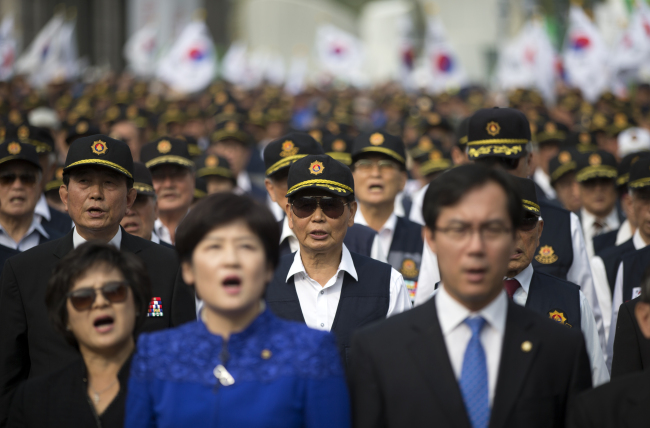In emphasizing the necessity for state-led history education, Education Minister Hwang Woo-yea told local university chiefs Tuesday that “countries suffering from social conflict such as Turkey and Greece use state-authored textbooks.”
The Park Geun-hye administration, which has recently repossessed the publishing rights for secondary education history textbooks from local publishers, has also emphasized the importance of “learning a unified version of history to dissolve disputes in the society.”
 |
Participants of a rally decrying the “political bias” of current history textbooks including ruling Saenuri Party officials sing the national anthem Thursday at Seoul Station in Yongsan-gu, Seoul. (Yonhap) |
But critics have raised suspicion over the effectiveness of centralized history education.
Former Vice Minister of Education Kim Jae-choon ― who was one of the henchmen for Park’s contentious policy ― had claimed in a research paper six years ago that state history textbooks are “a system only used in underdeveloped or dictatorial states.” He was sacked earlier this week, after opponents of the state textbook launched a myriad of attacks over his apparent flip-flop.
Reports suggest state-prepared textbooks have been subject to negative perceptions in countries like Turkey.
According to a 2011 article by Hurriyet Daily News, an English daily in Turkey, Turkish textbooks have been frequently been subject to criticism over “Sexism, discriminatory attitudes and a lack of objectivity.”
Citing local scholars including Kenan Cayir, a sociology professor at Istanbul Bilgi University, the article pointed out that nationalistic attitudes and stereotypical descriptions had been common in the textbooks, although their appearance had been less frequent over the years. Some of the cited examples were “fearless Turk,” “enemy Greek” and “housewife mother.”
The daily mentioned an excerpt from a 2007 literature textbook, which said: “Although the Turkish nation established great civilizations and served humanity in many ways, in the last centuries it fell behind the West due to some social and political reasons, which were not its fault.”
Similar to criticism that Korean education is often subject to, the daily also said that Turkish education has been under fire for focusing on rote memorization.
Citing Athens historian Anna Frangoudaki, Hurriyet Daily News also pointed out that most of the history topics in the Greek textbook ― another of Hwang’s examples of countries using state textbook ― are “ethnocentric.”
South Korea’s push to centralize education by emphasizing a “unified version of history that can end social conflicts,” has also been likened to Russia’s move following its leader Vladimir Putin’s instructions to historians to produce a “unified history” that is free from internal contradictions and ambiguities.
Reports from various news sources, including Reuters, said the government guidelines contained no criticism of the president, any reference of movements against him in 2011 and 2012 or mention of his political foes.
By Yoon Min-sik
(
minsikyoon@heraldcorp.com)








